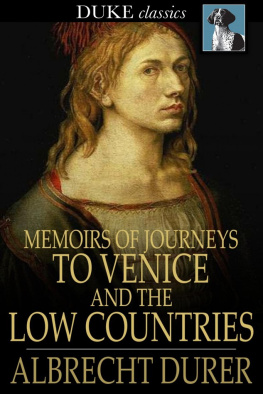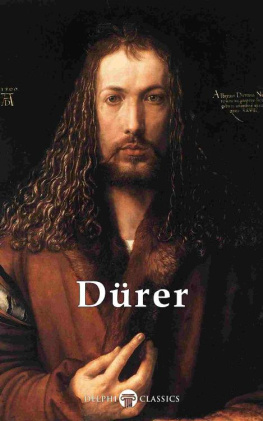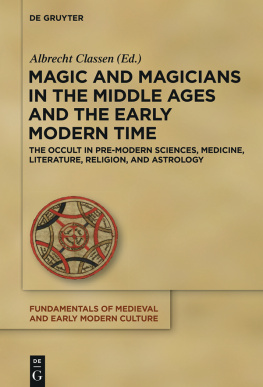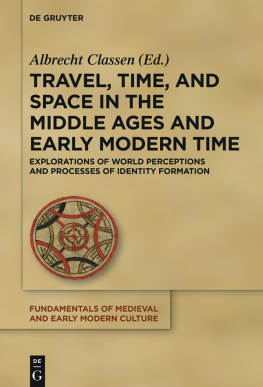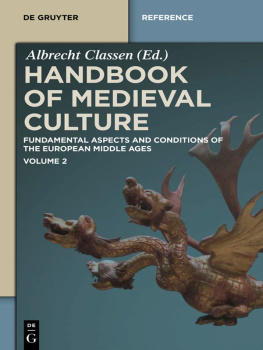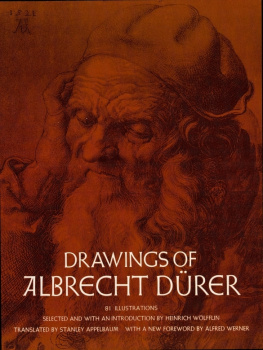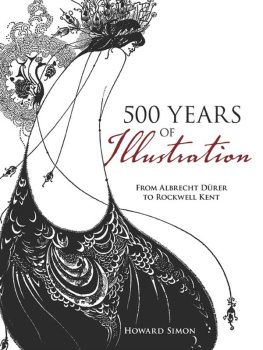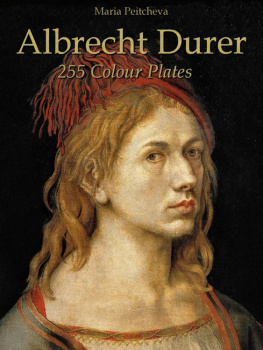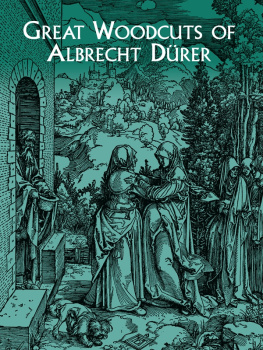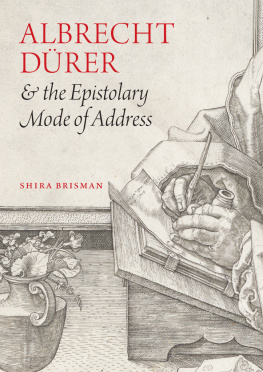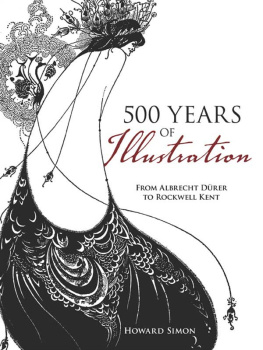Albrecht Durer - Memoirs of Journeys to Venice and the Low Countries
Here you can read online Albrecht Durer - Memoirs of Journeys to Venice and the Low Countries full text of the book (entire story) in english for free. Download pdf and epub, get meaning, cover and reviews about this ebook. year: 2012, publisher: Duke Classics, genre: Home and family. Description of the work, (preface) as well as reviews are available. Best literature library LitArk.com created for fans of good reading and offers a wide selection of genres:
Romance novel
Science fiction
Adventure
Detective
Science
History
Home and family
Prose
Art
Politics
Computer
Non-fiction
Religion
Business
Children
Humor
Choose a favorite category and find really read worthwhile books. Enjoy immersion in the world of imagination, feel the emotions of the characters or learn something new for yourself, make an fascinating discovery.
- Book:Memoirs of Journeys to Venice and the Low Countries
- Author:
- Publisher:Duke Classics
- Genre:
- Year:2012
- Rating:4 / 5
- Favourites:Add to favourites
- Your mark:
- 80
- 1
- 2
- 3
- 4
- 5
Memoirs of Journeys to Venice and the Low Countries: summary, description and annotation
We offer to read an annotation, description, summary or preface (depends on what the author of the book "Memoirs of Journeys to Venice and the Low Countries" wrote himself). If you haven't found the necessary information about the book — write in the comments, we will try to find it.
This early travelogue gives readers a fascinating glimpse into European life and customs in the Renaissance and early modern periods. The book recounts author Albrecht Durers travels in and observations of Italy and the Netherlands on the cusp of the sixteenth century.
Memoirs of Journeys to Venice and the Low Countries — read online for free the complete book (whole text) full work
Below is the text of the book, divided by pages. System saving the place of the last page read, allows you to conveniently read the book "Memoirs of Journeys to Venice and the Low Countries" online for free, without having to search again every time where you left off. Put a bookmark, and you can go to the page where you finished reading at any time.
Font size:
Interval:
Bookmark:

From a 1913 edition
ISBN 978-1-62012-432-1
Duke Classics
2012 Duke Classics and its licensors. All rights reserved.
While every effort has been used to ensure the accuracy and reliability of the information contained in this edition, Duke Classics does not assume liability or responsibility for any errors or omissions in this book. Duke Classics does not accept responsibility for loss suffered as a result of reliance upon the accuracy or currency of information contained in this book.
Whatever one's final estimate of his art, Drer'spersonality is at once so imposing and so attractive, andhas been so endeared to us by familiarity, that something ofthis personal attachment has been transferred to ouraesthetic judgment. The letters from Venice and the Diaryof his journey in the Netherlands, which form the contentsof this volume, are indeed the singularly fortunate meansfor this pleasant intercourse with the man himself. Theyreveal Drer as one of the distinctively modern men of theRenaissance: intensely, but not arrogantly, conscious of hisown personality; accepting with a pleasant ease theuniversal admiration of his genius-a personal admiration,too, of an altogether modern kind; careful of his fame asone who foresaw its immortality. They show him as having,though in a far less degree, something of Leonardo daVinci's scientific interest, certainly as possessing aquick, though naive curiosity about the world and a quitemodern freedom from superstition. It is clear that hisdominating and yet kindly personality, no less than hisphysical beauty and distinction, made him the center ofinterest wherever he went. His easy and humorous good-fellowship, of which the letters to Pirkheimer are eloquent,won for him the admiring friendship of the best men of histime.
To all these characteristics we must add a deep and sincerereligious feeling, which led him to side with the leaders ofthe Reformation, a feeling which comes out in his passionatesense of loss when he thinks that Luther is about to be putto death, and causes him to write a stirring letter toErasmus, urging him to continue the work of reform. For allthat, there is no trace in him of either Protestantism orPuritanism. He was perhaps fortunatecertainly as an artisthe was fortunateto live at a time when the line ofcleavage between the reformers and the Church was not yet somarked as to compel a decisive action.
Roger Fry
Agnes: Drer's wife
Wilibald Pirkheimer: Drer's best friend
Wolgemut: The master painter to whom Drer began formaltraining as an apprentice. Later, Drer painted a richlydetailed self-portrait of him.
Giovanni Bellini: Famous Renaissance painter andcontemporary of Drer.
Jan van Eyk: Famous Renaissance painter.
Imhof: Hans Imhof, the elder, at Nuremberg; the youngerImhof was in Venice.
Schott: Kunz Schott, an enemy of the town of Nuremberg.
Weisweber: A Nuremberg general.
Marcelli: A Venetian coin worth 10 soldi.
Stiver: A Netherlandish coin worth about 80 pfennigs.
Philip's: A Netherlandish coin worth rather less than aRhenish florin.
Crown: A Netherlandish coin worth 6.35 marks.
Noble: The Rosennobel = 8 marks, 20 pfennigs. The Flemishnoble = 9 marks, 90 pfennigs.
Blanke: A silver coin = 2 stivers.
Angel: An English coin = 2 florins, 2 stivers Netherlandish.
To the Honourable and wise Wilibald Pirkheimer, inNuremberg.
My dear Master, To you and all yours, many happy good NewYears. My willing service to you, dear Herr Pirkheimer. Knowthat I am in good health; may God send you better even thanthat. Now as to what you commissioned me, namely, to buy afew pearls and precious stones, you must know that I canfind nothing good enough or worth the money: everything issnapped up by the Germans.
Those who go about on the Riva always expect four times thevalue for anything, for they are the falsest knaves thatlive there. No one expects to get an honest service of them.For that reason some good people warned me to be on my guardagainst them. They told me that they cheat both man andbeast, and that you could buy better things for less moneyat Frankfort than at Venice.
As for the books which I was to order for you, Imhof hasalready seen to it, but if you are in need of anything else,let me know, and I shall do it for you with all zeal. Andwould to God that I could do you some real good service. Ishould gladly accomplish it, since I know how much you dofor me.
And I beg of you be patient with my debt, for I thinkoftener of it than you do. As soon as God helps me to gethome I will pay you honourably, with many thanks; for I haveto paint a picture for the Germans, for which they aregiving me 110 Rhenish gulden, which will not cost me as muchas five. I shall have finished laying and scraping theground-work in eight days, then I shall at once begin topaint, and if God will, it shall be in its place for thealtar a month after Easter.
(Editor note: This refers to the (altarpiece called the)"Madonna of the Rose Garlands," painted for the chapel of S.Bartolommeo, the burial-place of the German colony. Aboutthe year 1600 it was bought for a high price by the EmperorRudolf II, who is said to have had it carried (over theAlps) by four men all the way to Prague to avoid the risk ofdamage in transport. (It suffered serious water damageduring the Thirty Years' War of 1618-1648, and many parts ofit had to be repainted to replace much of the original paintthat was lost, but) it still remains one of the mostimportant (and lavishly colored) of all Drer's works.)
The money I hope, if God will, to put by; and from that Iwill pay you: for I think that I need not send my mother andwife any money at present; I left 10 florins with my motherwhen I came away; she has since got 9 or 10 florins byselling works of art. Dratzieher has paid her 12 florins,and I have sent her 9 florins by Sebastian Imhof, of whichshe has to pay Pfinzing and Gartner 7 florins for rent. Igave my wife 12 florins and she got 13 more at Frankfort,making all together 25 florins, so I don't think she will bein any need, and if she does want anything, her brother willhave to help her, until I come home, when I will repay himhonourably. Herewith let me commend myself to you.
Given at Venice on the day of the Holy Three Kings(Epiphany), the year 1506. Greet for me Stephen Paumgartnerand my other good friends who ask after me.
Albrecht Drer
First my willing service to you, dear Master. If it is wellwith you, I am as whole-heartedly glad as I should be formyself. I wrote to you recently. I hope the letter reachedyou. In the meantime my mother has written to me, chiding mefor not writing to you, and has given me to understand thatyou are displeased with me because I do not write to you;and that I must excuse myself to you fully. And she is muchworried about it, as is her wont. Now I do not know whatexcuse to make, except that I am lazy about writing and thatyou have not been at home. But as soon as I knew that youwere at home or were coming home, I wrote to you at once; Ialso specially charged Castel (Fugger) to convey my serviceto you. Therefore I most humbly beg you to forgive me, for Ihave no other friend on earth but you; but I do not believeyou are angry with me, for I hold you as no other than afather.
Font size:
Interval:
Bookmark:
Similar books «Memoirs of Journeys to Venice and the Low Countries»
Look at similar books to Memoirs of Journeys to Venice and the Low Countries. We have selected literature similar in name and meaning in the hope of providing readers with more options to find new, interesting, not yet read works.
Discussion, reviews of the book Memoirs of Journeys to Venice and the Low Countries and just readers' own opinions. Leave your comments, write what you think about the work, its meaning or the main characters. Specify what exactly you liked and what you didn't like, and why you think so.

